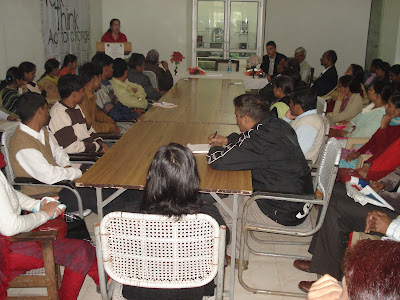












"Humankind have to contend with the vagaries of nature, which remains inscrutable, making life unpredictable. Questions relating to life and death, suffering and the caprice of fate, and common conduct, always exercise the human mind. Society comes into being in response to the needs of human life dictating interdependence. Codes of conduct become necessary to curb and control greed and selfishness. Religion rises in a bid to understand the origin and end of life, to propitiate the supernatural power that seems to control, command and kill at will. It seeks a way of life embracing the individual and society, groping for communion with the True Reality inhering all existence," said
Professor Sarva-Daman Singh, the Honorary Consul of India for Queensland, Australia, while giving a lecture under the auspices of Open Space - Lucknow on "The Role of Religion in Society" at the Department of Ancient Indian History and Archaeology, University of Lucknow on 1st December, 2009.
He added, "Morality takes its birth out of the constantly felt need to control and channel the human will towards the greatest good of the greatest number. Religion and morality combine to please and placate Providence; to discipline human conduct for the greatest good of humanity."
Professor Singh, who is also the Director of the Institute of Asian Studies, Brisbane, Australia, went on to say, "Religions broadly agree on a supernatural source and cause of creation, which presupposes the fraternity of all humanity, leaving no room, despite doctrinal diversity, for discord, intolerance and violence. If life is sacred, as our religions and secular laws alike uphold, it behoves us to preach and practise tolerance and engage in inter-religious dialogue to bring out the similarities of ethical values, instead of constantly harping on differences. Wars and violence, intolerance and unholy terrorism are a travesty of true religion, whatever its name. The ethical precept of religion evokes the best in human nature, sanctifying it with religious prescription.
"Monopolistic, exclusive, narrow formulations of the Truth consigning unbelievers to hell will not deliver the world from violent conflict. The ultimate Truth admits of many manifestations and many modes of worship. We must defeat the purveyors of intolerance with deliberate purpose, and do better than submitting to the tyranny of texts without weighing them in the scales of justice and fair-play. Religion must continually evolve to answer the needs of an ever evolving society. The search for ever greater truth must ceaselessly go on. Let us understand, live and let live.
"Life is full of suffering. Religion helps us cope. All religions must emphasize the indivisibility of humanity, enabling us to identify with one another. There can be no peace without peace among religions. There can be no peace among them without dialogue. No dialogue is possible without respectful tolerance. Religious peace is a pre-requisite to world peace. And peace, like humanity, must always remain indivisible:
sarvam shantih."































































































